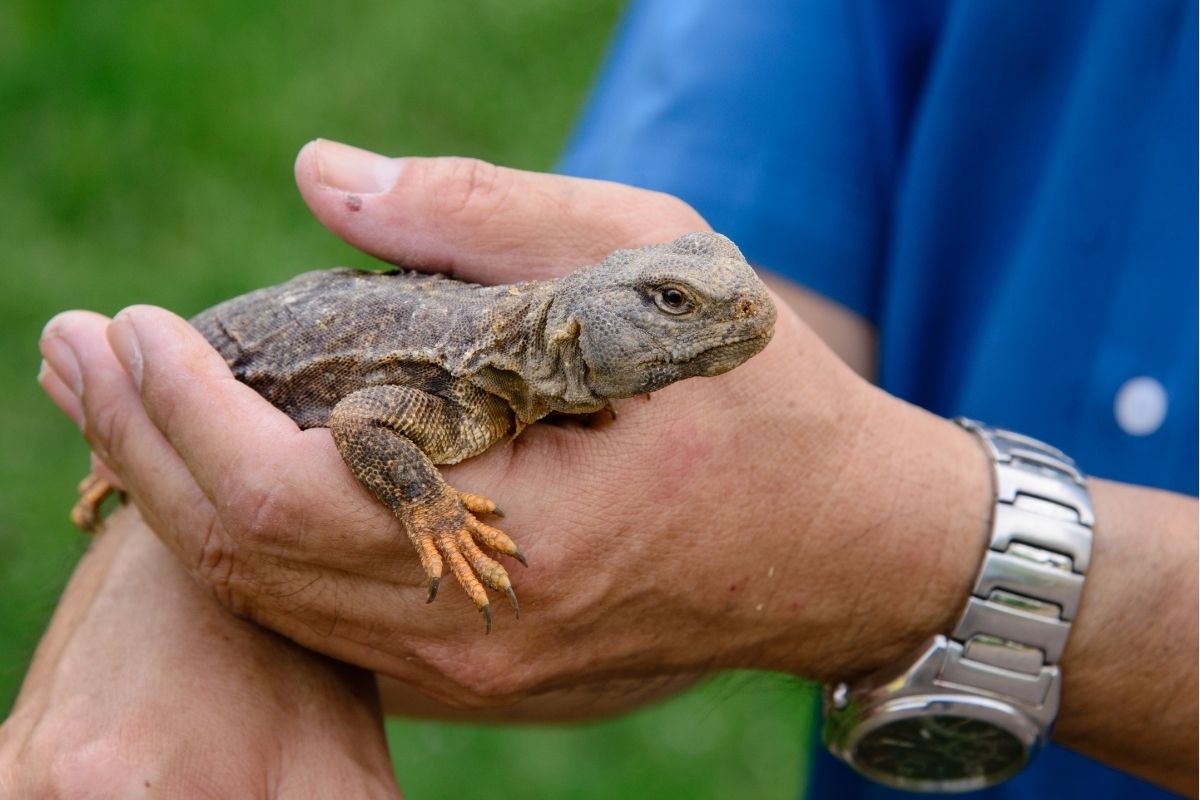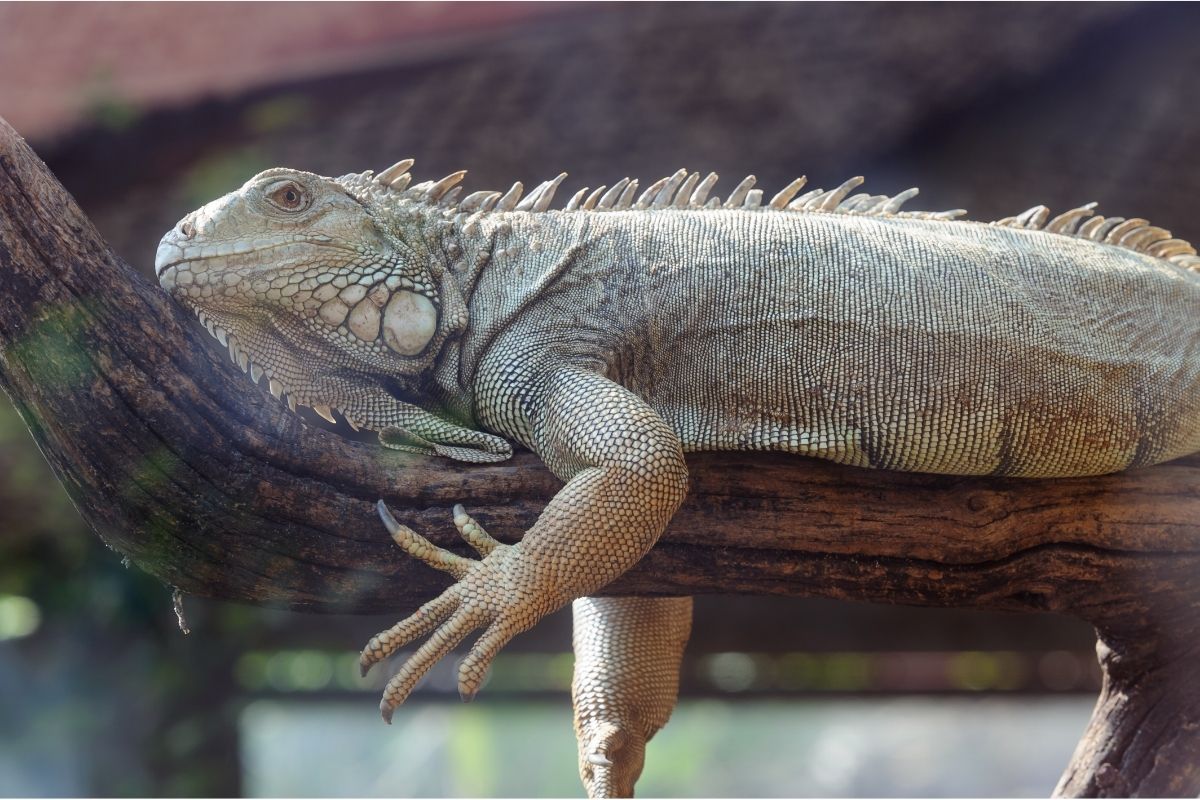If you are interested in owning a bearded dragon, or you have one already, then you may or may not be aware of metabolic bone disease (also referred to as MBD).
Metabolic bone disease is a devastating illness that can affect bearded dragons, causing them much pain and discomfort and eventually leading to paralysis and death.

As a bearded dragon owner, you should make sure that you know all about MBD, how to prevent it, how to spot it, and how to treat it. Knowing this information could prolong the life of your bearded dragon.
We have put together this useful guide to tell you everything you need to know about metabolic bone disease in bearded dragons, so keep reading to find out more.
What Is Metabolic Bone Disease?
Metabolic bone disease is an illness that affects bearded dragons. It causes their bones to become brittle, making them very fragile.
The condition can lead to fractures, which can cause severe damage to the animal’s body. This can result in paralysis and even death.
Metabolic bone disease is caused by a vitamin D deficiency. Vitamin D helps regulate calcium levels within the bloodstream, and when there is too little vitamin D present, calcium cannot be absorbed properly.
This leads to the bones becoming weak and brittle, which can result in fractures.
The most common symptoms of metabolic bone disease include the following:
- Difficulty walking
- Poor appetite
- Lethargy
- Weight loss
- Painful joints
- Weakness
- Dehydration
How Can I Prevent Metabolic Bone Disease In My Bearded Dragon?
There are many ways that you can help prevent metabolic bone disease from affecting your bearded dragon. You should always ensure that they get plenty of sunlight every day.
As we mentioned earlier, vitamin D is important for regulating calcium levels within the blood, and without enough vitamin D, calcium cannot be absorbed into the bloodstream effectively.
Therefore, if you want to avoid metabolic bone disease, you should expose your bearded dragon to sunlight on a daily basis.
You can also feed your bearded dragon a diet rich in calcium. Calcium is essential for healthy bones, so if you give your bearded dragon good quality calcium-rich food, they will absorb the calcium easily and store it safely inside their bodies.
You can buy calcium supplements specifically designed for bearded dragons. These supplements contain high amounts of calcium, and they are easy to administer.
However, remember that you should never use these supplements if you do not know what dosage to give your bearded dragon.
If you notice any changes in your bearded dragon’s behavior, such as lethargy, weakness, weight loss, or difficulty moving around, then you should contact your vet immediately.
They can perform tests to determine whether your bearded dragon has metabolic bone disease. If they discover that your bearded dragon does have MBD, then they can prescribe treatment for you.
If you suspect that your bearded dragon has metabolic disease, then you should take your pet to see your veterinarian right away.
Your vet may recommend that you start giving your bearded dragon vitamin D supplements, and they may also suggest feeding them a calcium-rich diet.
If your bearded dragon has MBD, then they may need to undergo surgery to repair damaged bones.
What Are Some Common Causes Of Metabolic Bone Disease In Bearded Dragons?
Metabolic bone disease can affect all types of reptiles, but it is more common in bearded dragons than in other species.
This is because bearded dragons tend to live indoors, where they spend much of their time sleeping. Because they are asleep, they are unable to soak up sufficient quantities of sunlight to produce adequate amounts of vitamin D.
Bearded dragons that are kept in small cages are at greater risk of developing MBD. The reason behind this is that they often lack access to natural sunlight, and therefore, they are unable to make enough vitamin D.
Also, if you keep your bearded dragon in a cage, then they are less likely to exercise, which means that they are less likely to build strong muscles and bones.
Bearded dragons that are fed commercial diets are also more prone to develop MBD.
Commercial diets usually consist of low-quality protein sources, like meat byproducts, and they are rarely supplemented with vitamins and minerals. This makes them deficient in certain nutrients, such as calcium.
The type of lighting used in reptile enclosures also plays an important role in the development of MBD. Reptiles that are exposed to fluorescent lights are more susceptible to MBD.
This is because they emit ultraviolet radiation, which interferes with the production of vitamin D. It is recommended that you provide your bearded dragon with UVB light during the summer months when they are most active.
If you think that your bearded dragon might be suffering from MBD, then you should consult your vet immediately.
They will conduct a thorough examination and test your bearded dragon’s blood levels to determine whether they are experiencing problems with their metabolism.
How Is MBD In Bearded Dragons Treated?

MBD is treated using various methods. One of the most effective ways to treat MBD in bearded dragons is to supplement their diets with vitamin D. You can do this by mixing powdered vitamin D into their food.
Alternatively, you can give your bearded dragon a vitamin D injection directly into their bloodstream. Vitamin D supplementation is particularly helpful if your bearded dragon is not getting enough sun exposure.
Your vet may also recommend that you feed your bearded dragon a calcium-rich diet to help strengthen their bones. However, you should only use calcium supplements that contain high concentrations of phosphorus.
Phosphorus is one of the main components of bone, so you want to avoid any supplements that have too much phosphorus.
Calcium supplements that are rich in phosphorus are available for purchase online or through pet stores.
Your vet may also suggest that you place your bearded dragon on a special diet that has been specially formulated for reptiles. These diets typically include higher-quality proteins, along with added vitamins and minerals.
If you choose to go down this route, then you should ensure that you buy the right products. There are many different brands of reptile foods available, and some of them are better suited to bearded dragons than others.
You can also try feeding your bearded dragon a diet that includes kelp. Kelp contains large amounts of iodine, which helps prevent thyroid gland issues.
Your vet may also prescribe thyroid medication to your bearded dragon if they believe it is necessary.
Finally, if all else fails, then you can perform surgery on your bearded dragon to remove excess fat deposits. This is a last resort option, but it is often very successful at treating MBD.
What Are The Symptoms Of Metabolic Bone Disease In Bearded Dragons?
The symptoms of MBD in bearded dragons vary depending on the severity of the condition. Some of the common signs include:
- Weight loss
- Lethargy
- Loss of appetite
- Poor skin and coat condition
- Difficulty breathing
- Swollen legs
- Abnormal posture
- Deformed claws
- Soft tissue masses
- Unusual behavior
- Excessive shedding
- Coughing
- Sore throat
- Vomiting
- Diarrhea
If you notice any of these symptoms in your bearded dragon, then you should contact your veterinarian as soon as possible.
They will need to conduct a full physical examination to determine what is causing your bearded dragon to suffer from metabolic bone disease.
What Happens If MBD Is Left Untreated?
Untreated MBD can lead to serious health problems. It can cause your bearded dragon to become weak and lethargic, making it difficult for them to move around.
As a result, your bearded dragon could develop respiratory infections, pneumonia, kidney failure, and other life-threatening conditions. MBD can also be fatal. A severe case of MBD can lead to death within weeks.
However, death may not always come that quickly. Some bearded dragons with irresponsible owners are left to suffer for years, their bodies slowly deforming, and they eventually die a very painful death.
Frequently Asked Questions
Can Juvenile Bearded Dragons Get MBD?
Bearded dragons can develop MBD at any age; it is not a disease that only affects older lizards. If a juvenile bearded dragon is being kept in poor conditions, then they are just as at risk of MBD as an adult bearded dragon.
Is MBD Painful For Bearded Dragons?
MBD is a very painful disease as it causes bone damage. The pain often stops the bearded dragon from being able to walk. The bone becomes weak and could snap at any time, and if this happens, it is extremely painful.
MBD also causes joint pain. Once the treatment for MBD has started, the pain will gradually begin to ease.
Is MBD Curable Or Fatal?
MBD is a curable bone disease, but if you leave it untreated, then it can be fatal. It depends on the lizard and the severity of their condition as to how quickly the disease will kill them if they do not receive any treatment.
Once your bearded dragon has received the right medical attention and has started treatment, their symptoms will gradually begin to improve as their bones become healthier.
The best cure is to prevent the disease from developing in the first place by ensuring that you provide the right living conditions for your bearded dragon.
How Long Does It Take For Bearded Dragons To Recover From MBD?
How long it takes your bearded dragon to recover from MBD will depend on the individual lizard and how severe the disease is.
It can take a few weeks for some lizards, whereas others will take months to recover. It also depends on the treatment they are receiving.
If you are concerned that your bearded dragon is not recovering fast enough, then take them back to the vet as soon as possible. The vet might recommend an alternative form of treatment if they think it is necessary.
How Is MBD Diagnosed?
In some cases, vets are able to diagnose MBD based on the symptoms alone. If your bearded dragon is displaying obvious symptoms of MBD or the disease is quite advanced, then a diagnosis will be very straightforward.
There are some instances when it is not as clear, and in those circumstances, the vet will order blood tests to check if your bearded dragon has MBD before they make their diagnosis.
The blood test will check to see if there is an imbalance between the amount of phosphorus and the amount of calcium in the lizard’s system. The vet can also use an X-ray to have a look at the bone structure of the bearded dragon.
Summary
Metabolic bone disease in bearded dragons is a serious disease. It is curable if you catch it fast enough, but if you don’t, then it could lead to a slow and painful death.
